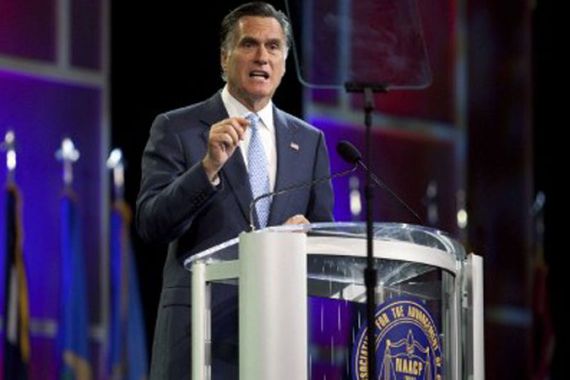The terrible economy and the anti-election of 2012
Amid financial turmoil, both candidates prefer to attack each other than to lay out an economic vision.

It is the worst economic situation since the Great Depression, and you might think at least one of the candidates for president of the United States would come up with a few big ideas for how to get us all out of it.
But you’d be wrong. Neither candidate wants to take any chances by offering any large, serious proposals. Both are banking instead on negative campaigns that convince voters the other guy would be worse.
President Obama has apparently decided against advancing any bold ideas for what he’d do in the second term, even if he had a Congress that would co-operate with him.
| Inside Story US 2012: Will rising poverty affect the US election? |
He’s sticking to a worn script that says George W Bush caused the lousy economy, congressional Republicans have opposed everything he’s wanted to do to boost it, it’s slowly on the mend anyway, the Bush tax cuts shouldn’t be extended for the rich, and we shouldn’t take a chance electing Romney.
Yet the public wants bigger ideas from the president, and wants to know what he’ll do in his second term to get us out of this mess. A New York Times–CBS News poll released last week showed that a majority of voters believe the president “can do a lot about” the economy. That’s a double-digit jump from the autumn of 2011.
The president could propose a new Works Progress Administration, modelled after the depression-era jobs program that hired hundreds of thousands of jobless US citizens to rebuild the nation’s infrastructure, or a new Civilian Conservation Corps.
He could suggest permanently exempting the first $25,000 of income from payroll taxes, and making up the lost revenues by eliminating the ceiling on income subject to it. He could propose resurrecting the Glass-Steagall Act and breaking up the big banks, so Wall Street doesn’t cause another financial collapse.
But you won’t hear any of this, or anything else of this magnitude, because the White House doesn’t want to take any risks. Polls give Obama a slight edge in the critical eight or so battleground states, so, the thinking goes in the Obama camp, why say anything that might give Romney and the GOP a target?
Besides, polls also show Romney isn’t well-liked by the electorate.
So Obama has decided to campaign as “the anti-Romney”.
Mitt Romney is playing it even more cautiously. His economic plan is really a non-plan: more tax cuts for the rich, undefined spending cuts, and no details about how he’d bring down the budget deficit. No presidential candidate since Herbert Hoover in 1928 has been more vague about what he’d do on the critical issues facing the nation.
Romney’s advisers assume Obama can’t possibly be reelected with the economy this bad. Just 44 per cent of registered voters in a Washington Post–ABC News poll in July approved the job the president was doing on the economy, while 54 per cent disapproved. Even more encouraging for Romney is that 41 per cent of those polled “strongly” disapproved of Obama’s economic performance, while just 21 percent “strongly” approved – an enthusiasm gap of major proportion.
|
“The two anti-the-other-guy strategies fit with a ton of negative advertising that’s just begun, but will reach mammoth proportions after Labour Day.“ |
So Romney’s advisers have concluded that all Romney has to do between now and election day is to avoid a mistake that might give Obama and the Democrats something to shoot at.
Romney has decided to campaign as “the anti-Obama”.
The two anti-the-other-guy strategies fit with a ton of negative advertising that’s just begun, but will reach mammoth proportions after Labour Day (the first Monday of September). Much of it will be financed by super-PACs and by political fronts already taking in hundreds of millions of dollars in secret donations. Romney’s camp hopes to out-negative Obama by almost two to one.
So whatever happens on election day, whoever the president turns out to be, they will have to contend with two handicaps. The public won’t have endorsed any new ideas or bold plans, which means he won’t have a clear mandate to do anything on the economy.
The only thing the public will have decided is that it fears and distrusts the other guy more. Which means the winner will also be burdened by almost half the electorate thinking he’s a scoundrel – or worse.
It’s the worst economy since the Great Depression, but we’re in an anti-election that will make it harder for the next occupant of the Oval Office to do a single thing about it.
Robert Reich is Chancellor’s Professor of Public Policy at the University of California at Berkeley. He has served in three national administrations, most recently as secretary of labour under President Bill Clinton. He has written thirteen books, including The Work of Nations, Locked in the Cabinet, Supercapitalism, and his most recent, Aftershock. His “Marketplace” commentaries can be found on publicradio.com and iTunes. He is also Common Cause’s board chairman.
A version of this article was earlier published at http://robertreich.org/
